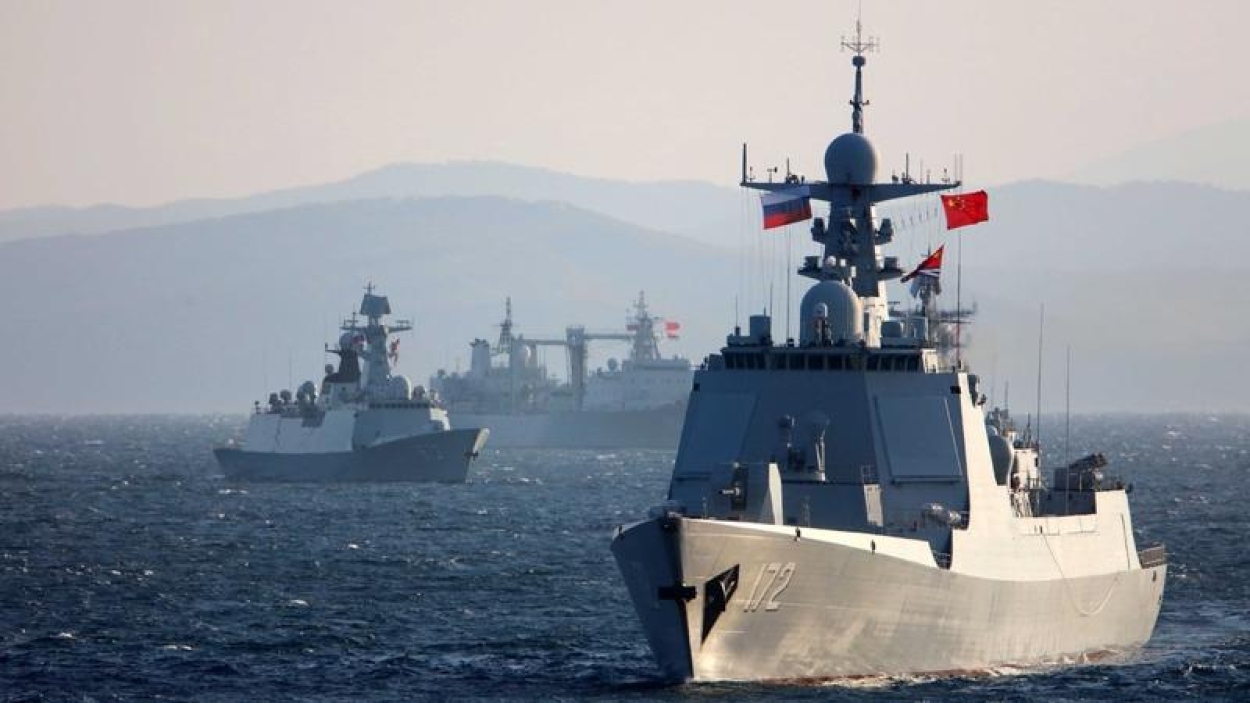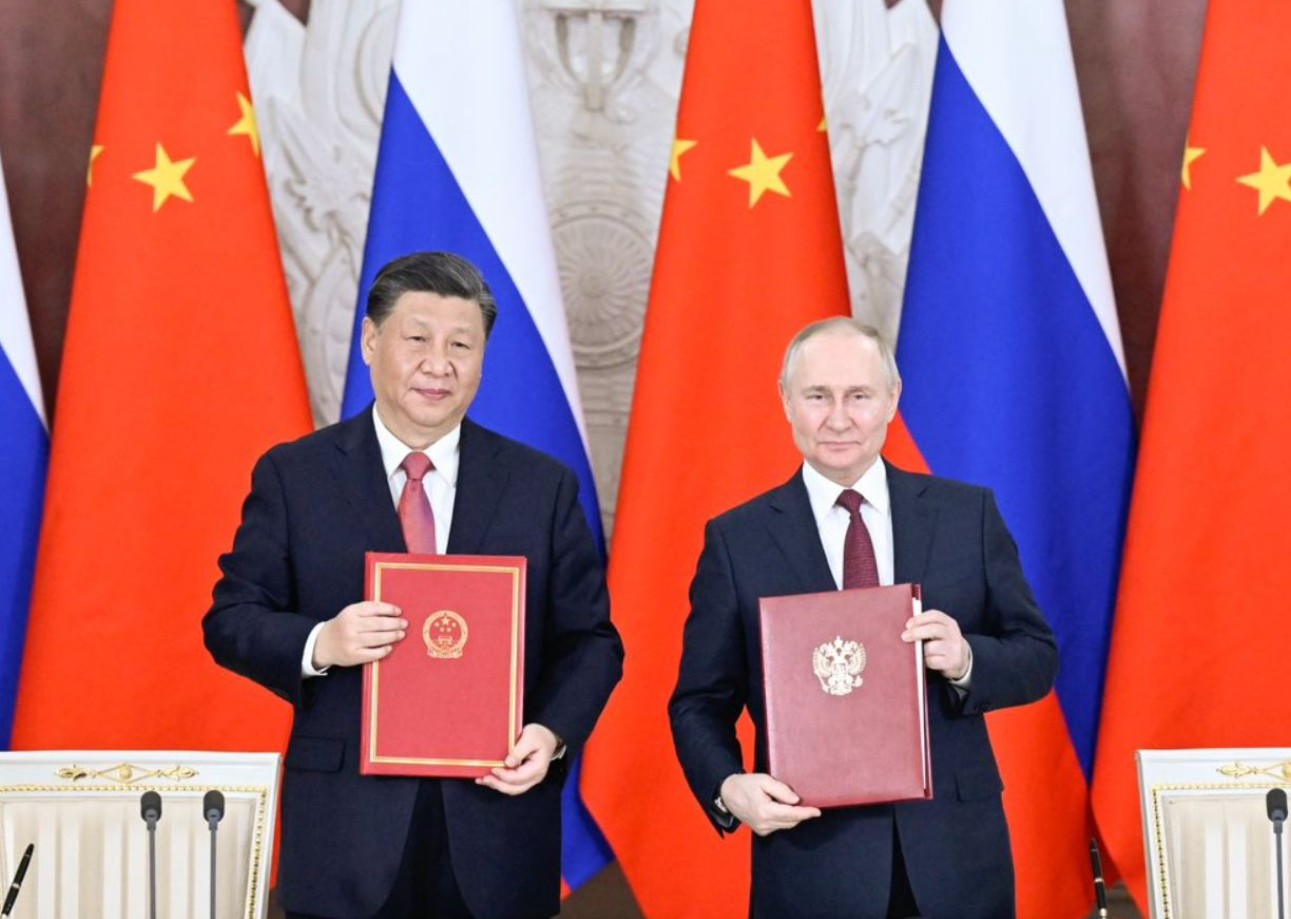As the conflict between Russia and Ukraine continues, Kremlin Spokesman Dmitry Peskov said that it’s time for the US and Ukraine to realize that Russia cannot be beaten on the battleground.
Biden’s belief in Kyiv’s ability to seize lost territories points to Washington’s deadlock position and the need for Russia to proceed with the special military operation, Peskov added. A fragment of the interview was posted on the journalist’s Telegram channel.
Meanwhile, Mikhail Podolyak, an adviser to the head of the Ukrainian presidential office, said Kyiv doesn’t need any initiatives to surrender part of its territory in exchange for some guarantees and NATO membership.
The Guardian reported that NATO’s former Secretary General Anders Fogh Rasmussen suggested that NATO should invite Kyiv to join the coalition without the region it no longer controls.
Russia, China Alliance
Russian President Vladimir Putin’s remarks during a meeting with China’s top military officer overseeing the People’s Liberation Army (PLA) in Moscow suggest the two nations propose sharing satellite intelligence and data.
Putin’s statement assumes significance as the two countries’ relations with the United States (US) remain tense, where they both perceive a threat from the Washington-led alliance.
The description, wording, and implied meaning of Putin’s exchange with Vice-Chairman of China’s Central Military Commission Zhang Youxia suggest jointly working on advanced defense technologies.
However, experts warn not to read too much into Putin’s comments, which can sometimes be exaggerated — in this case, about the scale and scope of Russo-Chinese defense cooperation.
They assess that it is inconsistent with the distinct nature of the strategic-military cooperation Russia and China have evolved over the last decade. Whether a slip-up, personal quirk, or a deliberate ploy to test the waters with China is unknown, but it has undoubtedly forced Western analysts to sit up and take notice.
What Putin Said
According to the transcript released by the Kremlin, after touching upon burgeoning “trade and economic ties” and multilateral associations like BRICS and Shanghai Cooperation Organization (SCO) groupings led by the two nations, Putin turned to defense technology cooperation.
Putting it in the classic Russian terminology as “military-technical,” Putin termed this field increasingly important.
“As for military-technical cooperation, our efforts in high-tech sectors have emerged as a primary focus. I am referring to space, high-orbit assets, the latest weapons, and those in the pipeline — they will, no doubt, ensure strategic stability for Russia and the People’s Republic of China.”
Russia, China Cooperation
“Space” refers to the joint lunar base Moscow and Beijing have planned, symbolizing their strategic alliance’s qualitatively enhanced nature. “High-orbit” assets, according to China’s People’s Armed Police Propaganda Bureau member Zhao DaShuai, could mean Putin referring to “using Chinese satellite-based capabilities.”
Andrew Korybko, a Moscow-based foreign affairs analyst, also agrees. “It wouldn’t be surprising if they’re expanding related cooperation into associated fields like satellite intelligence.”
Korybko is referring to the ballistic missile detection radar Russia is helping China build, which makes sharing satellite data and intelligence the next logical step.
Putin revealed the existence of the “missile attack early warning system” during the sixteenth meeting of the Valdai Discussion Club on October 3, 2019, in Sochi. “This is a severe thing that will radically enhance China’s defense capability,” he said.
Vedomosti reported that a contract worth US$60 million was signed to develop software for the early warning radar system. Interfax said, “The ground segment consists of a network of Voronezh over-the-horizon radar stations.” “They operate in different radio wave bands. Radars are capable of detecting space, ballistic, and aerodynamic objects.”
Russian Radar & Chinese Satellites
VYZGLYAD quoted former deputy commander of the air defense of the Russian ground forces Alexander Luzan, who said the land component of the system also comprises the Podsolnukh short-range radar.
“For Russia, such cooperation is important because if a single information space is created (with) data exchange from Chinese radars, the security of our country from the east will be better.”
The Voronezh detects intercontinental ballistic missiles (ICBM) at a range of approximately 4,000 to 6,000 kilometers, while the Podolsnukh can send beams that bend around the earth’s surface. Placed around the Chinese coastline, they can observe ships over the horizon and medium and short-range missiles.

For such radar to function optimally, it needs satellite monitoring, an area where Moscow is relatively weak and Beijing commands a lead. Putin’s reference to “space, high-orbit assets” suggests Russia is hinting at China to activate the next stage of the MAEW so Moscow can begin benefiting from the mutually beneficial arrangement.
Developing Joint Weapons & ‘Military Alliance’
Zhao DaShuai also revealed that “Sino-Russian cooperation” is primarily constrained by “many considerations at the state-to-state level” than Putin’s ambitious framing suggests. “China is meticulously balancing between the West and Russia.”
Zhao was referring to Beijing’s business, trade, and investment-oriented diplomacy. This is evident in US allies in Europe and Asia not taking a complete hardline by entirely throwing in their lot with Washington and often signaling to Beijing that it values its deep commercial interests.
The European Union (EU) rushed to sign the Comprehensive Agreement on Investment (CAI) with China immediately after President Joe Biden’s administration took over. France and Germany (under Chancellor Olaf Scholz and Angela Merkel) have often desired more independence in their ties with China.
In Asia, except for Japan, no southeast Asian country criticized China’s live-fire drills around Taiwan in August 2022 following then-US Speaker Nancy Pelosi’s visit. The same is true for the US’s Middle Eastern allies Israel, Saudi Arabia, and the UAE, where each is part of some Belt and Road Initiative component.
Even more interestingly, Israeli nemesis Iran also maintains robust commercial ties with China, and neither of them ever had a reservation with Beijing economically courting the other. Economic considerations are also a significant part of China’s calculus before launching a military invasion of Taiwan.
Russia and China are jointly developing weapons that venture into the realm of a formal alliance that would erode China’s economic clout with these countries and shift the narrative in Washington’s favor. But most importantly, neither China nor Russia need a formal, legally binding military alliance.
Their strategic exercises and coordinated naval and air drills pressured US allies Japan and South Korea on different fronts in the western Pacific, which would take the pressure off either Moscow or Beijing when either of them was fighting Washington. This is without having to rush to the aid of the other militarily. (Previous articles on this tacit strategic coordination can be read here, here, and here).
Vasily Kashin, a senior research fellow in the Center for Comprehensive European and International Studies at Moscow’s Higher School of Economics, said this about a possible Russia-China military alliance.
“The reality of Russia-China defense cooperation is complicated. A working and effective military alliance can be formed quickly if needed. But current foreign policy strategies make such a move unlikely unless there is real and imminent danger of military conflict with the United States.”

Putin’s Overstatements?
This leaves the question of why Putin would frame his comments in such ambitious terms. “Unlike Chinese leaders, Putin can be a lot more ad hoc when it comes to what he says,” Zhao said.
Kashin said in his piece that Putin’s 2019 statement on the Ballistic Missile Early Warning System (BMEWS) “was likely made without prior consultation with the Chinese and has caused unease in Beijing.”
He embarrassed the Chinese side again in October 2020 during the next Valdai conference when he suggested the possibility of a military alliance with China.
“The Chinese Ministry of Foreign Affairs’ reaction to this statement was positive, but the Chinese side refrained from using the word alliance,” Kashin said.
- The author can be reached at satamp@gmail.com
- Follow EurAsian Times on Google News




